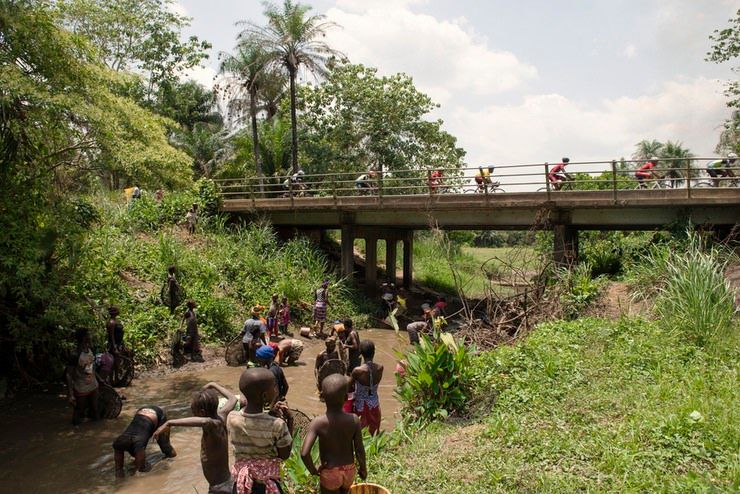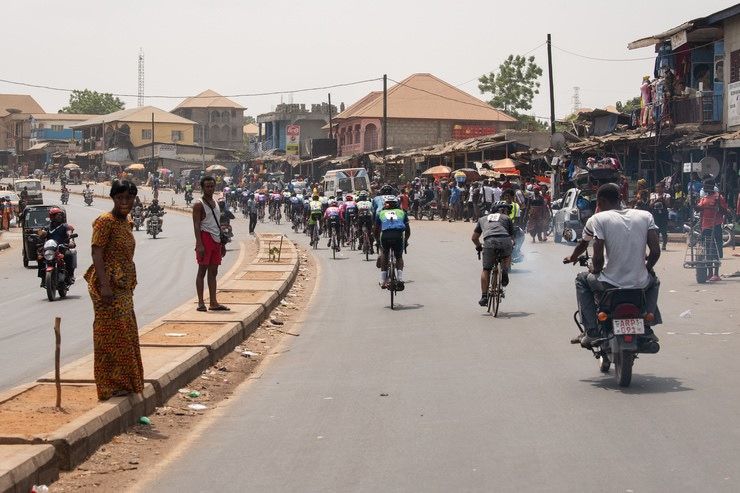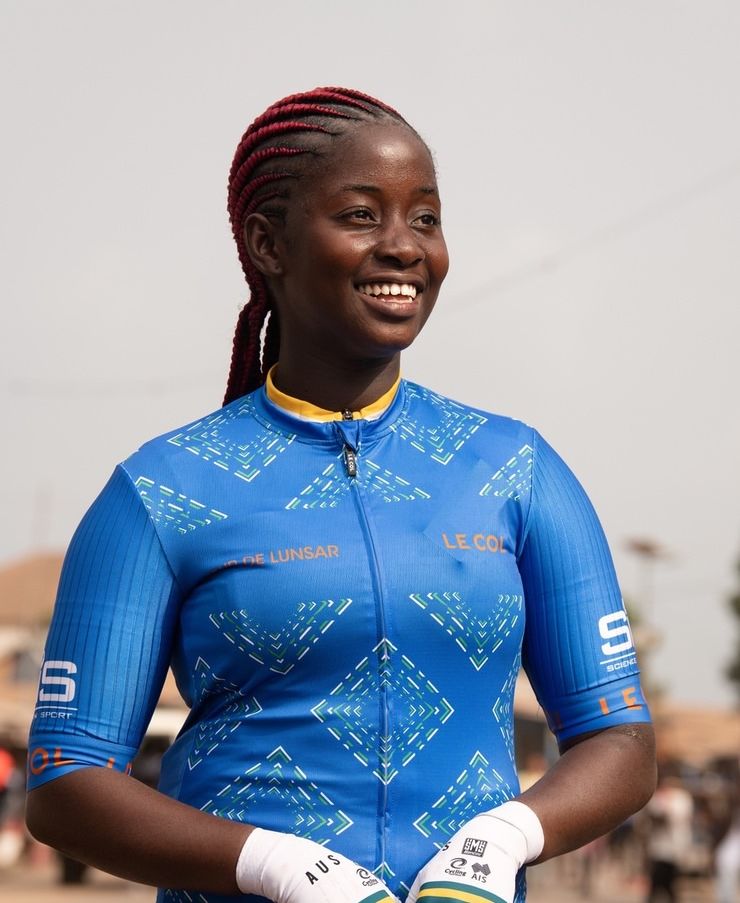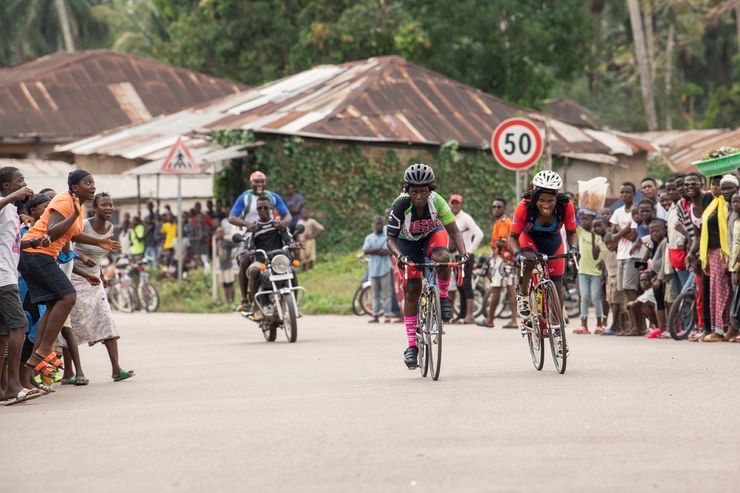Images: Matt Grayson
This week, a small, busy mining town in west Africa will come together, unified by their passion for cycling. The SIS Tour de Lunsar 2023 is in town.
The images are always striking: passionate fans lining the route to catch a sight of their heroes riding past; winners roaring in celebration wearing second-hand kit; life and joy on display in one of the poorest countries on earth.
The SIS Tour de Lunsar is the brain-child of Karim Kamara, a local bike shop manager and founder of the Lunsar Cycling Team. Since the first edition in 2013, Kamara has overseen the evolution of the event which has become the biggest bicycle race in Sierra Leone.

Tom Owen, who runs cycling marketing agency Fausto and fundraises for the Tour de Lunsar, spoke about the humble early days of the race.
‘ The first year they ran it, there were about ten lads who were in some way connected to the bike shop that Karim runs and it was just for them to have a race to compete in,’ Owen says. ‘They went around asking businesses in Lunsar if they could give a prize and I think he managed to get a USB flash storage drive that would be worth about $5.’
Jump ahead ten years and the Tour de Lunsar now has a high-profile sponsor in SIS and comprises three races over five days, with cash prizes for jersey and stage winners across the categories.
This week, 50 riders will take part in the men's three-day stage race and around 80 will compete in the junior race. A women's one-day race will be run the day before the men's, with the winner awarded a blue jersey sponsored by Team Africa Rising. All the races sit outside of the UCI system and the jurisdiction of Sierra Leone’s national cycling federation.
The man at the centre of it all, Kamara, is not just a race organiser and bike shop manager, he has become a pillar in the community of Lunsar, working to improve the everyday lives of those living there through cycling.
Sierra Leone is the fifth poorest country in the world and the life expectancy is just 59. The country’s recent history is steeped in the tragedies of the Ebola virus and civil war.

For Kamara, the best response to the struggles of everyday life isn’t to set out on dangerous migrant highways - as many do. Instead, he advocates for staying home and finding a life worth living in Sierra Leone.
Owen agrees: ‘One of the things that Karim is really big on is to show through the race that Sierra Leone is a beautiful country and that you can have a good life, you can have a fulfilling rich life. That's something that often gets lost. Unemployment is crazy, particularly among the young. The average age of the country is 19 and they are sort of trapped. There aren't any jobs.
‘With cycling, all of a sudden there's a reason to be involved. There's a reason to stay here. There's something to dedicate yourself to.
‘Cycling has this really powerful ability to improve people’s lives. Being a cyclist isn’t just about five days at the Tour de Lunsar; it’s about commitment, discipline and better health. There have been opportunities for people to start up their own businesses.
‘Karim has this dedication to be pushing and pushing on behalf of the community. It’s phenomenal.’
Over the ten years of the Tour de Lunsar, cycling participation in the country has grown, building on the history of established cycling clubs across the West African nation. The race gives these riders a bigger platform to show their skills and improve.
‘There are other cycling clubs in Sierra Leone and there have been for ages, so I don't want it to seem as though we invented cycling in Sierra Leone,’ Owen explains.

‘The Tour de Lunsar represents this focal point for the entire sport. It's the thing everybody trains for. It's the thing that clubs in Freetown, clubs in Bo and Kenema - all these towns – it’s what they're all looking at. They're all trying to get fit for the Tour de Lunsar.
‘It introduces Sierra Leonean riders to a type of racing that they've never encountered before. Some of them take to it better than others. There was a guy in 2021 who won the first stage and then blew up so spectacularly the next day that he was 9 minutes down on GC by the end.’
With the growth of cycling in Sierra Leone, more and more have the same dream as any competitive cyclist - to ride their bike for a living and to race the biggest races in the world. The Tour de Lunsar aims to be a stepping stone for Sierra Leone’s cyclists to achieve that dream.
The reality is, there’s a vast chasm between racing the Tour de Lunsar and becoming a professional.
One rider has come close. Deborah Conteh, a multiple-time winner of the women's race, signed a contract with the CANYON//SRAM Generation team in 2022. After a year of trying to get a visa, Conteh was unable to get out of Sierra Leone.

If riders can't get to Europe due to visa issues, how are riders from Sierra Leone going to progress towards the professional ranks? Owen thinks that the answer is the development of the Tour de Lunsar, making the race bigger and tougher for the home riders.
‘We’ve got two international teams coming this year. One of them is more of a grassroots club from Lagos in Nigeria. They are called Pitsop. The other team are Mikes Bikes [from the USA]. I'm really excited about them because I think they'll be able to really raise the level and lay down the challenge to the top Sierra Leone riders who would otherwise maybe run away with it.
‘Bringing people to this race, making this race bigger, more difficult and raising the level. That's super important for the health and onward progress of Sierra Leone and cycling there more generally.’
A rider trying a different route is Ibrahim Jalloh. Jalloh won every jersey available to him at last year's race. Recently he has moved to Dubai on a temporary basis to work and race to see if he can build a career from there. As a result, Jalloh will be absent from the start-line this week.

So which riders are likely to be at the front of this year’s Tour de Lunsar? Owen highlights a few of the likely protagonists…
‘Ibrahim Jalloh not racing this year blows the men’s race apart in many respects, so it'll be interesting to see who emerges as an overall contender.
‘I'm excited to see what Abu Sheik Sesay [Lunsar Cycling Team] can do. He's won stages in the past, but maybe he’s not had that consistency to drive all the way to the line.
‘Moses Sesay [Lunsar Cycling Team] is phenomenally quick. I think he's the quickest guy which means if the stages finish in bunch kicks he could come away with the yellow jersey.
‘Team Flames is one of the strong Freetown teams. They’ve got Tenesie Dixon who will be their leader. He’s a good rider, smart as well.
‘Team C2C’s best rider is Alie Tholley. He’s very quick. He must weigh about 50 KGs though, which isn’t necessarily perfect for this race.’
The women’s race also promises to be competitive, especially with the birth of a new team which is the first ever female-only outfit in Sierra Leone.
‘The team is called Ubuntu. It's being led by Deborah Conteh, who is the reigning champion.
‘Elizabeth Mansaray is riding for Team C2C. I suspect she might be the best athlete in the country, but I think it’s a confidence thing or her racing nous – she always seems to come second.
‘Blessing Jabbie [Kono CC] is a strong rider. We got her on Zwift last year and her power-to-weight is insane. If we had any climbs in this race at all, she’d be winning by 20 minutes.’

To those outside of Sierra Leone these riders may mean nothing, but to those within the town of Lunsar, they are icons.
‘When they see a home-grown rider like Moses Sesay - who won stage three of the Tour the last two years - when they see him win, hell yeah they’re going to run and pick him up with his bike because they're local heroes.’
The Tour de Lunsar is an amazing event. It’s everything a bike race should be – joy, competition, opportunity and excitement – but all the in the context of a nation reeling.
The race gives riders from Sierra Leone their only real opportunity to show their talent, to move towards their dreams of riding their way out of poverty. If they are talented enough, they should have the opportunity to do just that.
Unfortunately, cycling doesn’t always work like that. Opportunity is not equally distributed.
In world cycling, there should be a system where anyone with the talent and the will can have the opportunity to travel the pathway to the top. They may not get there, but it should be possible.
The Tour de Lunsar, at least, gives the cyclists of Sierra Leone a first step to take.











Member discussion